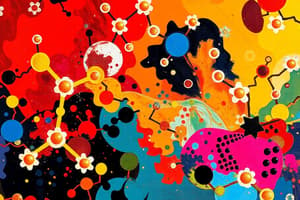Podcast
Questions and Answers
What is the process called when cyclic a and b anomers of sugar interconvert in solution?
What is the process called when cyclic a and b anomers of sugar interconvert in solution?
- Dehydration
- Mutarotation (correct)
- Oxidation
- Hydrolysis
2-Deoxy-D-Ribose is an example of a sugar alcohol.
2-Deoxy-D-Ribose is an example of a sugar alcohol.
False (B)
What type of sugar derivative is formed by replacing the hydroxyl group at C2 with an amino group?
What type of sugar derivative is formed by replacing the hydroxyl group at C2 with an amino group?
Amino sugar
Phosphate esters are derived from sugars in metabolism, such as ________ and ________.
Phosphate esters are derived from sugars in metabolism, such as ________ and ________.
Match the following sugar derivatives with their definitions:
Match the following sugar derivatives with their definitions:
What is the primary function of carbohydrates?
What is the primary function of carbohydrates?
Polysaccharides can be hydrolyzed into more than 10 molecules of monosaccharides.
Polysaccharides can be hydrolyzed into more than 10 molecules of monosaccharides.
Define monosaccharides.
Define monosaccharides.
Glucose is an example of a _______ carbohydrate.
Glucose is an example of a _______ carbohydrate.
What condition is associated with disturbance in carbohydrate metabolism?
What condition is associated with disturbance in carbohydrate metabolism?
Match the types of carbohydrates with their definitions:
Match the types of carbohydrates with their definitions:
Glycoproteins and glycolipids play roles in cell signaling.
Glycoproteins and glycolipids play roles in cell signaling.
Cellulose is a type of _______ and serves a structural role in plants.
Cellulose is a type of _______ and serves a structural role in plants.
Which hexose is also known as dextrose and serves as a major energy source in mammals?
Which hexose is also known as dextrose and serves as a major energy source in mammals?
Ribose and deoxyribose are components of nucleic acids such as RNA and DNA.
Ribose and deoxyribose are components of nucleic acids such as RNA and DNA.
What are the intermediates of carbohydrate metabolism?
What are the intermediates of carbohydrate metabolism?
Excess glucose in the blood is called __________.
Excess glucose in the blood is called __________.
Match the sugars with their corresponding functions or sources:
Match the sugars with their corresponding functions or sources:
Sorbitol, the reduced form of glucose, can contribute to cataract formation.
Sorbitol, the reduced form of glucose, can contribute to cataract formation.
What source of energy is primarily found in the seminal fluid?
What source of energy is primarily found in the seminal fluid?
The structure of coenzymes NAD, NADP, and flavoproteins contains __________.
The structure of coenzymes NAD, NADP, and flavoproteins contains __________.
Which sugar is synthesized in mammary glands?
Which sugar is synthesized in mammary glands?
What class of carbohydrates can be hydrolyzed to yield simpler sugars?
What class of carbohydrates can be hydrolyzed to yield simpler sugars?
All monosaccharides contain the same number of carbon atoms.
All monosaccharides contain the same number of carbon atoms.
Name the most important natural monosaccharide.
Name the most important natural monosaccharide.
Hexoses are a type of monosaccharide that contains ___ carbon atoms.
Hexoses are a type of monosaccharide that contains ___ carbon atoms.
Match the following monosaccharides with their types (Aldoses or Ketoses):
Match the following monosaccharides with their types (Aldoses or Ketoses):
Cyclization of glucose can result in two forms known as furanose and pyranose.
Cyclization of glucose can result in two forms known as furanose and pyranose.
What determines whether a monosaccharide is classified as an aldose or a ketose?
What determines whether a monosaccharide is classified as an aldose or a ketose?
If the hydroxyl group (OH) is positioned on the left, the anomer is said to be ___.
If the hydroxyl group (OH) is positioned on the left, the anomer is said to be ___.
What is the formula to represent monosaccharides?
What is the formula to represent monosaccharides?
Which of the following is a pentose?
Which of the following is a pentose?
What do structural isomers have in common?
What do structural isomers have in common?
D-Glucose and d-glucose refer to the same molecule.
D-Glucose and d-glucose refer to the same molecule.
What is the significance of the 2nd last carbon in determining D or L configuration?
What is the significance of the 2nd last carbon in determining D or L configuration?
A type of optical isomer where only one asymmetric carbon differs is called an ______.
A type of optical isomer where only one asymmetric carbon differs is called an ______.
Which term describes mirror image isomers of sugars?
Which term describes mirror image isomers of sugars?
Match the following terms to their definitions:
Match the following terms to their definitions:
All asymmetric carbon atoms in epimers are the same.
All asymmetric carbon atoms in epimers are the same.
What role do enzymes play in isomerism?
What role do enzymes play in isomerism?
Racemase can convert dextrorotatory into ______ using a racemic mixture.
Racemase can convert dextrorotatory into ______ using a racemic mixture.
What is the difference between D and L sugars
What is the difference between D and L sugars
Flashcards
What are carbohydrates?
What are carbohydrates?
A broad category of organic compounds containing carbon, hydrogen, and oxygen atoms often described by the formula (CH2O)n. They are essential for living organisms serving as a primary energy source and playing structural, signaling, and precursor roles.
What are the functions of carbohydrates?
What are the functions of carbohydrates?
Carbohydrates are fundamental building blocks for many biological processes. Their primary function is to provide energy for cellular activities through the breakdown of glucose. They are essential for structural support in plants (cellulose) and animals (chitin). They also act as precursors for essential molecules such as nucleotides, which are components of DNA and RNA.
What is a monosaccharide?
What is a monosaccharide?
The simplest form of carbohydrates that cannot be broken down into smaller units. They are typically sweet-tasting and soluble in water.
What is a disaccharide?
What is a disaccharide?
Signup and view all the flashcards
What is an oligosaccharide?
What is an oligosaccharide?
Signup and view all the flashcards
What is a polysaccharide?
What is a polysaccharide?
Signup and view all the flashcards
What is hydrolysis?
What is hydrolysis?
Signup and view all the flashcards
What are carbohydrate metabolism disorders?
What are carbohydrate metabolism disorders?
Signup and view all the flashcards
Monosaccharides
Monosaccharides
Signup and view all the flashcards
Trioses
Trioses
Signup and view all the flashcards
Monosaccharides
Monosaccharides
Signup and view all the flashcards
D-Glucose
D-Glucose
Signup and view all the flashcards
Cyclization
Cyclization
Signup and view all the flashcards
Pyranose
Pyranose
Signup and view all the flashcards
Furanose
Furanose
Signup and view all the flashcards
Anomers
Anomers
Signup and view all the flashcards
Fischer Projection
Fischer Projection
Signup and view all the flashcards
Haworth Projection
Haworth Projection
Signup and view all the flashcards
Tetrose
Tetrose
Signup and view all the flashcards
Pentose
Pentose
Signup and view all the flashcards
Fructose
Fructose
Signup and view all the flashcards
Galactose
Galactose
Signup and view all the flashcards
Mannose
Mannose
Signup and view all the flashcards
Carbohydrate Digestion
Carbohydrate Digestion
Signup and view all the flashcards
Diabetes Mellitus
Diabetes Mellitus
Signup and view all the flashcards
Hyperglycemia
Hyperglycemia
Signup and view all the flashcards
What is mutarotation?
What is mutarotation?
Signup and view all the flashcards
What are sugar phosphates?
What are sugar phosphates?
Signup and view all the flashcards
What are deoxy-sugars?
What are deoxy-sugars?
Signup and view all the flashcards
What are amino sugars?
What are amino sugars?
Signup and view all the flashcards
What are sugar alcohols?
What are sugar alcohols?
Signup and view all the flashcards
Structural Isomers
Structural Isomers
Signup and view all the flashcards
Stereoisomers
Stereoisomers
Signup and view all the flashcards
D or L configuration
D or L configuration
Signup and view all the flashcards
Optical Activity
Optical Activity
Signup and view all the flashcards
Enantiomers
Enantiomers
Signup and view all the flashcards
Enzymes & Isomerism
Enzymes & Isomerism
Signup and view all the flashcards
Racemization
Racemization
Signup and view all the flashcards
Isomerism
Isomerism
Signup and view all the flashcards
Study Notes
Carbohydrate Chemistry (LEC 1) - Quick Summary
- Carbohydrates are naturally occurring compounds containing carbonyl groups (aldehydes or ketones) and hydroxyl groups.
- Carbohydrates are a primary energy source.
- They play crucial structural roles, acting as precursors to other biomolecules, and playing a role in cell signaling and recognition.
- Disturbances in carbohydrate metabolism can lead to metabolic diseases like diabetes, galactosemia, and lactose intolerance.
Monosaccharides
- Simplest carbohydrates; cannot be further hydrolyzed.
- Classified based on the number of carbon atoms (e.g., trioses, tetroses, pentoses, hexoses, heptoses, nonoses).
- Also classified based on the presence of an aldehyde or ketone group (aldoses, ketoses).
Disaccharides, Oligosaccharides, and Polysaccharides
- Disaccharides: Formed by combining two monosaccharides through hydrolysis, yielding two monosaccharide units.
- Oligosaccharides: Formed by combining 3-10 monosaccharides through hydrolysis, yielding 3-10 monosaccharide units.
- Polysaccharides: Formed by combining more than 10 monosaccharides through hydrolysis, yielding more than 10 monosaccharide units.
Glucose, Fructose, Galactose
- Glucose is a vital natural monosaccharide.
- It exists in a linear form and ring forms (pyranose and furanose).
- Monosaccharides can exist as alpha or beta anomers depending on the position of the hydroxyl group on the anomeric carbon in the ring structure.
- Fructose and galactose are other important monosaccharides, with fructose being a ketose and galactose an aldose.
Biological Importance of Carbohydrates
- Individual monosaccharides have varied roles, e.g., Ribose and deoxyribose are crucial components of nucleic acids (RNA and DNA).
- Glucose is the primary energy source in mammals.
- Other monosaccharides contribute to the structure and function of various biomolecules and play pivotal roles in different biological processes.
Stereochemistry and Isomerism
- Stereoisomers have the same molecular formula but different spatial arrangements of atoms.
- Optical isomers (enantiomers) are mirror images of each other and rotate plane-polarized light in opposite directions.
- Epimers are a type of diastereomer in which the difference is in the configuration around only one chiral carbon.
- Isomers such as anomers, differ only in the orientation around the anomeric carbon.
Optical Activity
- Optically active compounds rotate the plane of polarized light.
- D and L designations describe the direction of rotation.
- The D and L designation of a sugar depends on the configuration of the chiral carbon furthest from the carbonyl group.
Epimers
- Epimers are diastereomers that differ in the configuration around only one chiral center. A common example is glucose and galactose.
Anomers
- Anomers are a type of stereoisomer that differ by the configuration around the anomeric carbon in a cyclic sugar.
- Anomers are often alpha (α) or beta (β) forms.
Enantiomers
- Enantiomers are stereoisomers that are mirror images of one another.
- Enantiomers have identical physical properties except for their effect on polarized light.
Enzymes and Isomerism
- Enzymes are crucial in carbohydrate metabolism.
- Carbohydrate enzymes often distinguish between different types of isomers (enantiomers, epimers etc)
Mutarotation
- Spontaneous interconversion between α and β anomers in aqueous solution.
- A critical process in the metabolism of sugars.
Monosaccharide Derivatives
- Sugar phosphates are crucial intermediates in many metabolic pathways.
- Deoxysugars contain a reduced hydroxyl group.
- Aminosugars have an amino group instead of a hydroxyl group.
- Sugar alcohols result from the reduction of the carbonyl group in a sugar.
- Important examples of each are discussed.
- Specific types of sugar acids are also important in biological systems.
Studying That Suits You
Use AI to generate personalized quizzes and flashcards to suit your learning preferences.




